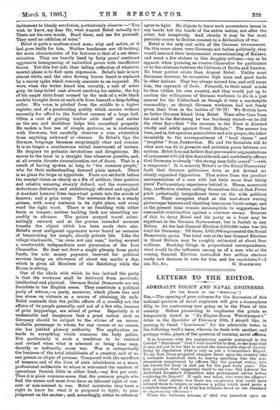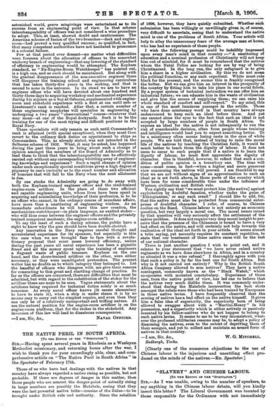LETTERS TO THE EDITOR.
ADMIRALTY POLICY AND NAVAL ENGINEERS.
LTO THE EDITOR Or THE SPECTATOR." j SIR,—The opening of your columns for the discussion of this national question of naval engineers will give a tremendous fillip to the controversy now going on in the Press of this country. Before proceeding to emphasise the points so temperately stated in "Ex-Engine-Room Watchkeeper's " letter in the Spectator of February 10th, I should like, in passing, to thank "Landsman" for his admirable letter in the following week's issue, wherein he deals with another, and perhaps wider, phase of the question of training naval officers.
It is, however, with the engineering aspects contained in the Cawdor " Statement " that I wish herewith to deal, in the hope that it may not yet be too late to arrest the irrevocable step of crystal- lising by regulation what is only as yet a Committee's Report. To say that these projected changes burst upon the country like a veritable bombshell fails to convey anything like the con- sternation experienced by officers like the present writer, who has known the Navy in and out for the past forty years. The first question that suggested itself to me was : Did Admiral Sir Archibald Douglas's Committee take professional advice before rendering its Report ? If such was taken, who were the officers ? and of what nature was their sea exj erience that could have induced them to inspire or endorse a policy which must prove a complete negation of all that has hitherto stood as our standard of engincering efficiency?
When the Selborne scheme of 1902 was launched upon an
astonished world, grave misgivings were entertained, as to its success from an engineering point of view. In that scheme
interchangeability of officers was not considered a wise procedure to adopt. This, at least, showed doubt and cautiousness. The American scheme of fusion of the two branches—deck and engine- room—had proved a very qualified success ; so qualified, in fact, that many competent authorities have not hesitated to pronounce it a colossal failure.
Few at that period ever dreamt—no matter what difficulties were foreseen about the allocation of officers to the somewhat unshowy branch of engineering—that any lowering of the standard of efficiency in engineering would be attempted. The Keyham standard, as "Ex-Engine-Room Watchkeeper" has pointed out, is a high one, and as such should be maintained. But along with the gradual disappearance of the non-executive engineer there will disappear the training school and engineering curriculum that has taken thirty-five years in the making, and that is second to none in the universe. In its stead we are to have an engineer officer who will have devoted about one hundred and thirty-three days to acquiring workshop and mechanical experience during his sojourn as a boy at Osborne, supplemented with engine- room and stokehold experience with a fleet at sea until sub- or Lieutenant's rank is reached. After that, a certain number of these engineering neophytes will specialise in engineering by undergoing a two years' " observational " course—whatever that may mean—at one of the Royal dockyards. Such is to be the training for one of the most trying and difficult positions in the Royal Navy.
These specialists will only remain as such until Commander's rank is attained (with special exceptions), when they must then revert to the ordinary deck duties on appointment to ships as Commanders. This, as already stated, was not intended in the Selborne scheme of 1902. What, it may be asked, has happened during the past three years to bring about such a change of opinion amongst the members of the Board of Admiralty as to lead them to think that the interchangeability can be effectively carried out without any corresponding whittling away of engineer-
ing knowledge and experience ? Such a rapid change of opinion under such exceptionally special conditions gives a high degree of
piquancy to one's curiosity as to the exact number and allocation of honours that will fall to the Navy when the next allotment is due.
• By one stroke the Admiralty are going to do away with both the Keyham-trained engineer officer and the civil-trained engine-room artificer. In the place of these two efficient and capable engineering units, whose lives have been spent in acquiring and assimilating knowledge of their profession, is to be an officer who cannot, in the ordinary course of mundane affairs, have more than a smattering of engineering wisdom. As an immediate subordinate he will have this new creation, the mechanician-watchkeeper—in plain language, an exalted stoker— who will thus come between the engineer officers and the privately trained competent mechanic, the engine-room artificer.
To say the least of such a daring scheme, the public have a right to know why the gun should have been double-shotted.
Any innovation in the Navy requires careful thought and accumulated experience for its sponsors, but especially is this the case when we are brought face to face with a revolu- tionary proposal that must mean lowered efficiency, unless during the past years all naval experience has been a gigantic fraud and all the money spent upon the training of engineers a flagrant waste of public treasure. Keyham on the one hand, and the shore-trained artificer on the other, were either
necessary, or they were unmitigated pretenders. The present writer has no doubts as to which category they belonged to. Let the handful of officers who disagree with me give their reasons for consenting to this great and startling change of practice. So far as the officers are concerned, there are difficulties that must be admitted, but with regard to the substitution of the stoker for the artificer there are none to be seen. Vague statements about the artificers being required for technical duties solely is so much nonsense. As every naval officer knows (it seems elementary to have to state it), when a ship is under steam it is by no means easy to carry out the simplest repairs, and even then they can only be of a relatively unimportant and trifling nature. At sea the natural position for the engine-room artificer is on the engine-room platform, that for the stoker in the stokehold. Any inversion of this law will lead to disastrous consequences.















































 Previous page
Previous page